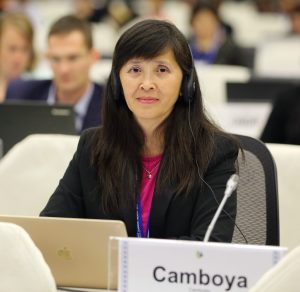MEDIA RELEASE: Cambodia: ASEAN mainstreams biodiversity in agriculture, forestry, and agrobiodiversity

The ASEAN Member States (AMS) are mainstreaming biodiversity within and across sectors, particularly in agriculture, forestry, and agrobiodiversity, through a biodiversity-based products project as reiterated in a statement by the Association of Southeast Asian Nations (ASEAN) read by Cambodia during the Second Meeting of the Subsidiary Body on Implementation (SBI 2) to the Convention on Biological Diversity (CBD) held in Montreal, Canada on 9 July 2018.
 Ms. Somaly Chan, Deputy Secretary-General, National Council for Sustainable Development, Ministry of Environment, Cambodia [Photo by: Francis Dejon | ENB/IISD]
Ms. Somaly Chan, Deputy Secretary-General, National Council for Sustainable Development, Ministry of Environment, Cambodia [Photo by: Francis Dejon | ENB/IISD]
Cambodia, speaking on behalf of the ASEAN, stated that in mainstreaming biodiversity within and across sectors, the ASEAN, through the Biodiversity-based Products as an Economic Source for the Improvement of Livelihoods and Biodiversity Protection (BBP) Project, with the support and collaboration of the GIZ and the ASEAN Centre for Biodiversity (ACB), has already initiated efforts along these lines for agriculture, forestry and agrobiodiversity. The ongoing efforts on the mainstreaming of biodiversity being undertaken by the ASEAN member-states would have as its aim the scaling up of efforts in biodiversity conservation while involving the indigenous peoples and local communities in the AMS aiming to strengthen good practices on sustainable development and the attainment of the Sustainable Development Goals, said Ms. Somaly Chan, Deputy Secretary-General of the National Council for Sustainable Development of Cambodias Ministry of Environment.
The BBP project focuses on the improvement of livelihood in selected Biodiversity Value Chains through capacity building and linking local growers with the private sector. Its products include bamboo furniture and handicraft from Lao PDR, and medicinal bath herbs, Giao co lam tea leaves, Bo khai vegetables, and honey from Viet Nam.
The AMS, through the project, will undertake a series of capacity-building activities to mainstream biodiversity-based value chains in the manufacturing and processing sectors in the region.
ACB Executive Director Dr. Theresa Mundita S. Lim emphasized the importance of resources found in the ASEAN region. The ASEAN region may only be three percent of the worlds total surface but it is still home to almost 20 percent of the worlds plants and animals; 34 percent of global coral reefs; 35 percent of the global mangrove forests; and over 200 million hectares of forest cover, which host a variety of ecosystem services primarily, as source of raw materials for various sectors.
The BBP Project is under an umbrella program funded by the Federal Government of Germany called, Protection of Biological Diversity in the ASEAN Member States in Cooperation with the ASEAN Centre for Biodiversity or the CARE4BioDiv Programme. The other two projects under the said program are the ACB-KfW Small Grants Programme (SGP) and the ACB-GIZ Institutional Strengthening of the Biodiversity Sector in ASEAN (ISB).
Aside from the BBP Project, ACB also hopes to further achieve mainstreaming of biodiversity on various thematic concerns through the Biodiversity Conservation and Management of Protected Areas in the ASEAN (BCAMP) Project ? a five-year conservation project under the EU-ASEAN Cooperation.
For more information about biodiversity in the ASEAN region, log on to www.aseanbiodiversity.org.
#####






